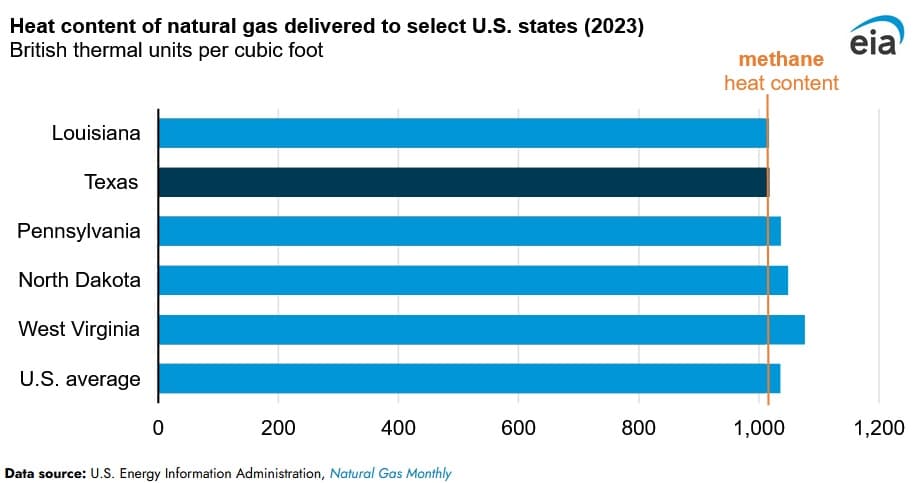Heat Content of Dry Natural Gas Below the National Average in Texas During 2023: EIA

The heat content of dry natural gas delivered in Texas during 2023 was 1.7 percent below the national average, according to an Sept.17 report published by the U.S. Energy Information Administration. During 2023 the heat content of dry natural gas in Texas averaged 1,018 British thermal units per cubic foot (Btu/cf) compared to the national average of 1,036 Btu/cf. Louisiana was the state with the lowest heat of dry natural gas during 2023.
The heat content of natural gas gives an indication of the commodity’s quality and composition. Both the quality and composition can differ significantly, depending on the geology of the producing basin. Wet natural gas consists principally of methane, along with additional hydrocarbon gases, mainly ethane and propane. The heat content value of methane is 1,010 Btu/cf, whereas ethane is 1,770 Btu/cf and propane 2,516 Btu/cf. The average heat content of natural gas is higher, when there are greater volumes of propane and ethane.
The cryogenic cooling method is used across processing plants across Texas to recover natural gas liquids (NGLs) from the natural gas stream to make dry natural gas fulfil consumer and pipeline quality protocols. In extracting NGLs, such as propane and ethane from the natural gas stream, the heat content of dry natural gas delivered to consumers across Texas was the second lowest across the U.S. during 2023.
In 2023, ethane comprised 44 percent of the NGL extracted from the natural gas stream in the Permian Basin, with propane contributing another 30 percent. Across the U.S. consumer natural gas fueled appliances usually utilize natural gas with a heat contract ranging between 950 to 1,100 Btu/cf.
Moreover, operators in Texas are struggling with takeaway capacity constraints for natural gas extracted from the oil-rich Permian basin. A wide positive price premium between the ethane price compared to natural gas incentivizes operators to extract progressively more liquids out of wet gas sourced from the Permian due to profitability, hence the heat content of Texan natural gas has become one of the lowest across the U.S.
EnerKnol Pulses like this one are powered by the EnerKnol Platform—the first comprehensive database for real-time energy policy tracking. Sign up for a free trial below for access to key regulatory data and deep industry insights across the energy spectrum.
ACCESS FREE TRIAL